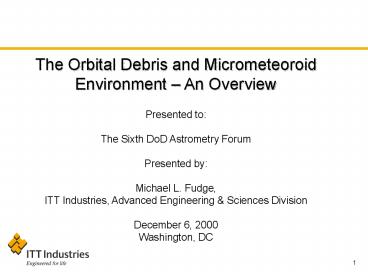Key Issue Proposed Congressional Action for LeaderFollower Initiative - PowerPoint PPT Presentation
1 / 11
Title:
Key Issue Proposed Congressional Action for LeaderFollower Initiative
Description:
1. The Orbital Debris and Micrometeoroid. Environment An Overview. Presented to: ... LEO constellations while controlled, 'fratricide' (constellation member vs. ... – PowerPoint PPT presentation
Number of Views:55
Avg rating:3.0/5.0
Title: Key Issue Proposed Congressional Action for LeaderFollower Initiative
1
The Orbital Debris and Micrometeoroid Environment
An Overview Presented to The Sixth DoD
Astrometry Forum Presented by Michael L.
Fudge, ITT Industries, Advanced Engineering
Sciences Division December 6, 2000 Washington, DC
2
Presentation Topics
- Micrometeoroid and Orbital Debris Environment
- Population images
- Catalog composition and spatial density
- Growth
- Regulation/Mitigation Measures
- Summary of US Government policies
- Other mitigation measures
- Effect on Growth
3
Low Earth Orbit Satellite Population
Image courtesy of Nicholas Johnson, NASA JSC
4
Total Earth Satellite Population
Image courtesy of Nicholas Johnson, NASA JSC
5
Composition of Satellite Catalog
Note increase in Operational S/C
6
LEO Spatial Density
- Orbcomm
- Tselina 2
- Iridium
- Globalstar/ Strela3
C
D
Image courtesy of Nicholas Johnson, NASA JSC, P.
Anz-Meador, Viking Science Technology
7
Debris Growth over Time
TOTAL
FRAGMENTATION DEBRIS
SPACECRAFT
ROCKET BODIES
MISSION-RELATED DEBRIS
Image courtesy of Nicholas Johnson, NASA JSC
8
Notes on Growth over Time
- Note leveling of
- rocket bodies
- operational debris
- (in general) fragmentation debris
- Current driver operational spacecraft
- LEO constellations while controlled,
fratricide (constellation member vs.
constellation member) not a threat
9
Growth Projections
Image courtesy of Nicholas Johnson, NASA JSC
10
US Government Policies
11
Other Mitigation Measures/History
- 1st true mitigation measures in 1980s
- ELV Industry self-policing in US/Europe to
mitigate against fragmentations on-orbit
passivation of upper stages - Cessation of many operational debris practices
beginning use of bolt-catchers, lanyards, etc. - 1995 NASA Guidelines
- 1998
- US DoD Guidelines
- FAA Passivation requirement
- 1999-2000
- NOAA, FCC getting involved
- Present Japanese, French, Russian, ESA guidelines
implemented 1996-2000































